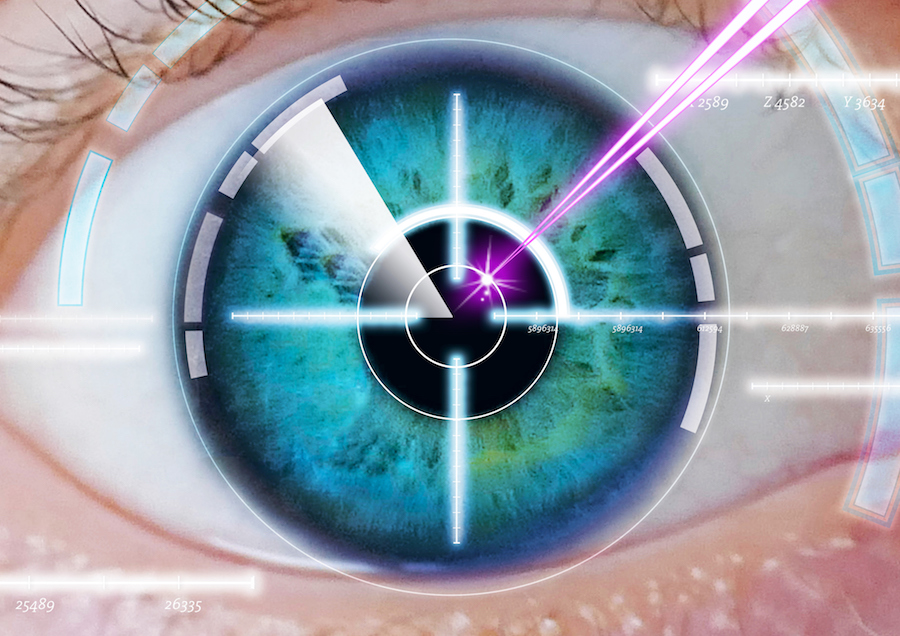Considering laser eye surgery? Here’s everything you need to know
If you’re sick of wearing glasses or contact lenses, the only other option to achieve clear vision is laser eye surgery – a procedure now thought to account for around 75% of UK surgical procedures.
Such operations, which are also known as refractive surgery or laser vision correction (LVC), correct eye problems such as short sight, long sight and astigmatism, using a laser to reshape the front of the eye, which improves the ability to focus.
It’s an increasingly popular option for people with sight problems, and the Royal College of Ophthalmologists (RCOphth) says more than 100,000 refractive surgery procedures are performed every year in the UK.
However, surgery to correct the need for glasses or contact lenses isn’t currently available on the NHS, and it also isn’t covered by private health insurance.
Private clinics charge from £595 up to £2,175 per eye, depending on the type of procedure, so it’s a big investment that needs very careful, well-informed consideration before you decide to take the plunge.
Who is laser eye surgery suitable for?
Laser eye surgery today
— Judd trump (@judd147t) July 28, 2017
Most people aged over 18 can have laser eye surgery, as long as they’ve had a stable spectacle prescription for at least two years. Short sight typically stablises by late teens or early twenties.
Mr Bruce Allan, a consultant ophthalmic surgeon at Moorfields Eye Hospital in London, says: “Laser eye surgery has been very widely used for the correction of short sight and astigmatism for over 20 years – we perform about 3,000 procedures a year at Moorfields, and over 16 million people worldwide have had LVC.
“Modern laser systems are also very effective at correcting long sight, which tends to affect people more in mid-life, and LVC for older patients is increasingly popular.”
He says around 99% of people in a large recent study published in the Review of Ophthalmology said that they were satisfied with the result of their laser treatment, and for the small minority of patients with a poor outcome, revision treatment is normally effective.
Thanks for your lovely tweets whilst I was away. Had laser eye surgery and can see properly now! Huge thanks to @DrDanReinstein xxx
— Carol Kirkwood (@carolkirkwood) October 16, 2017
You’re most likely to be suitable for laser eye surgery if your glasses prescription is in the range of :
:: Up to -10.00D of myopia or short sight
:: Up to +4.00D of hyperopia or long sight
:: Up to ±6.00D of astigmatism.
Patients may not be suitable for LVC if they have other eye conditions including cataracts, or problems with their eye surface. It also isn’t recommended for correcting reading prescriptions either, as these prescriptions change as you get older.
Other surgical options
Allan explains that implant-based techniques may be more suitable for some patients.
Lens implantation techniques have two main categories: refractive lens exchange (RLE), which is identical to cataract surgery where the natural lens is replaced with a lens implant, and phakic intraocular lenses (PIOLs), where artificial lenses are implanted in front of the natural lens without replacing it. This is often used in younger patients where the spectacle prescription is outside the normal range for laser eye surgery.
How do you choose a clinic?
The Royal College of Ophthalmologists (RCOphth) advises potential patients to think carefully before having refractive surgery. The RCOphth has a helpful checklist on its website (rcophth.ac.uk) that you can use in the consultation with the refractive surgeon.
Patients are strongly advised to choose a surgeon on the General Medical Council’s specialist register in ophthalmology (gmc-uk.org), or who has the Cert LRS qualification, which can be checked via the Royal College of Ophthalmologists.
Also, make sure the hospital or clinic is regulated with the relevant regulator for the area of the UK it’s based in.
The clinic should be clear from the start about the total cost of the procedure. This normally includes follow-up clinic visits and treatment for any problems resulting from surgery. Additional laser treatments to fine-tune the visual result, for two years after surgery, are normally included in the initial cost.
What happens during the surgery?
The treatment is usually carried out on both eyes during the same visit, and takes a around 30 minutes, although the laser is applied for only a minute or two. All procedures use anaesthetic drops to keep patients comfortable, and a spring clip is used to hold the eyelids apart.
Patients will be asked to look up at a target light during the treatment to help keep the eye in the right position, and lasers are then used to remove a lens-shaped piece of tissue to reshape the cornea beneath. While the three available treatments involve slightly different methods, all have similar results.
Patients can go home on the same day as surgery, with antibiotic and anti-inflammatory drops to help the eyes heal.
Risks and side-effects
Permanent loss of vision is rare after LVC, and the main risk is that further surgery may be needed for optimum results – up to one in 10 patients require some form of additional surgery.
In the early period after surgery, patients may see glare, halos, starbursts and ghost images, but such problems usually resolve within a few months.
There may also be intermittent blurring, temporary red blotches on the eyes, and dry eye symptoms, which can be treated with artificial tears, and should get better within a few months.
What results can you expect?
More than 95% of patients are satisfied with the outcome of surgery, and many describe it as life-changing.
Although glasses may still be needed for some activities after treatment, particularly for reading in older patients, Allan says: “A reasonable expectation is to have vision at the same level as you get in soft contact lenses, but without having to wear them.
“Another way of putting it is that you should see at least as well as a normal non-spectacle wearer.”
The Press Association
Latest posts by The Press Association (see all)
- 5 surprising things you can clean in the washing machine - January 9, 2025
- Prince William posted a heartfelt birthday message to ‘most incredible wife and mother’ - January 9, 2025
- Birthday wishes for Catherine from royal family as the Princess of Wales turns 43 - January 9, 2025
- Maple Cinnamon Granola - January 8, 2025
- 8 things your feet can tell you about your health - January 8, 2025





















